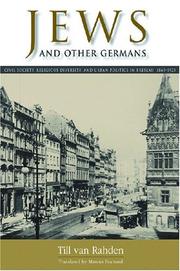| Listing 1 - 1 of 1 |
Sort by
|

ISBN: 0299226948 9780299226947 Year: 2008 Publisher: Madison (Wis.) : University of Wisconsin press,
Abstract | Keywords | Export | Availability | Bookmark
 Loading...
Loading...Choose an application
- Reference Manager
- EndNote
- RefWorks (Direct export to RefWorks)
"Jews and Other Germans is the first social and cultural history to probe the parameters of Jewish integration in the half century between the founding of the German Empire in 1871 and the early Weimar Republic. Questioning received wisdom about German-Jewish assimilation and the pervasiveness of anti-Semitism in Imperial Germany, van Rahden’s prize-winning book restores some of the complexity and openness of relations between Protestants, Catholics, and Jews before World War I. Closely analyzing the political, social, and cultural life in a major German city, van Rahden shows that Jews were a part of a broad urban community that encompassed diversity within unity, at once offering them a large measure of equality while permitting them to remain meaningfully Jewish. Jews and Other Germans also substantially revises the chronology of anti-Semitism in Germany, showing that Jews only began to experience exclusion from Breslau’s social world during World War I. Yet van Rahden not only illuminates Breslau’s multicultural fabric; he also tells the story of this remarkable city as one of cultural and religious conflict and coexistence. Recounting the experiences of Jews, Protestants, and Catholics within a single narrative, he offers a critical intervention into scholarship on liberalism and civil society in nineteenth- and early twentieth-century Europe." -- Publisher's description Examines the integration of Jews into German society between 1860-1925, taking as an example the city of Breslau (then Germany, now Wrocław, Poland). Questions whether there was a continuous line from the German treatment of Jews before World War I to Nazi antisemitism. During and after World War I, relations between Jews and non-Jews worsened and the high level of Jewish integration eroded between 1916-25. Although the constitution of the Weimar Republic accorded Jews equality, they experienced acts of violence and discrimination. Argues that antisemitism became stronger as the economic situation of the Jews deteriorated, due to inflation and the emigration to Germany of 4,273 impoverished Jews from Poland and Russia between 1919-23. Concludes, nevertheless, that no direct line can be drawn between the antisemitism in Imperial Germany and that of the Nazi period.
15.70 history of Europe. --- Catholics --- Catholiques --- Christenen. --- Ethnic relations. --- Etnische betrekkingen. --- Jews --- Joden. --- Juifs --- Protestants --- Soziale Situation. --- Verdraagzaamheid. --- Social conditions --- Social conditions. --- Conditions sociales --- Christ, ... --- Breslau. --- Juden. --- Poland --- Wrocław (Poland) --- Wrocław (Pologne) --- Wrocław. --- Relations interethniques.
| Listing 1 - 1 of 1 |
Sort by
|

 Search
Search Feedback
Feedback About UniCat
About UniCat  Help
Help News
News